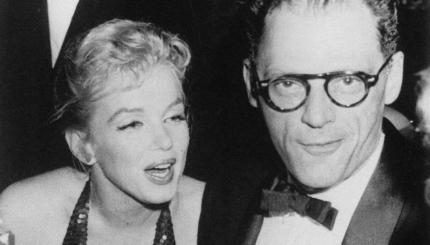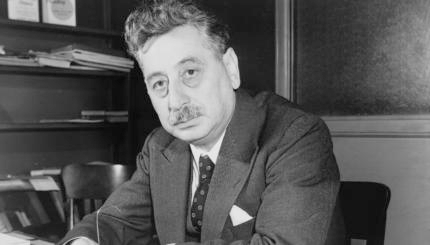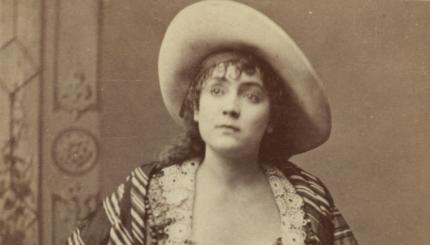Abridged and reprinted with permission from the Forward (July 30, 2004).
As the drama critic Martin Gottfried pointed out in his biography, Arthur Miller: His Life and Work (Da Capo Press, 2003), Miller is the only great British or American playwright to "write a play about what it means to be Jewish, apparently trying to deal with his own Jewishness."
Gottfried was speaking of Broken Glass, a 1994 drama set on the eve of the Holocaust, but Miller laced his writings with Jewish themes and characters for more than half a century, since his days as an undergraduate student at the University of Michigan.
First Confrontations with Jewishness
After graduating in the spring of 1938, Miller wrote two Jewish-themed plays in two years: The Grass Still Grows, an autobiographical family comedy with socialist overtones, and The Golden Years, an epic account of Cortez’s conquest of the Aztec Kingdom that doubled as a metaphoric excoriation of the Allies for attempting to appease Hitler.
With your help, My Jewish Learning can provide endless opportunities for learning, connection and discovery.
Miller failed to get either play produced and became convinced that the New York theatre establishment was scared to tackle overtly Jewish material. But in 1945 Miller scored a commercial success with his only novel, Focus, which, along with Laura Z. Hobson’s Gentleman’s Agreement, broke new societal ground in shining a critical light on the persistence of anti-Semitism. In several of his subsequent works, including After the Fall, Miller would grapple with the question of whether morality could exist in the shadow of the Holocaust.
Death of a Salesman
Despite his undeniable penchant for delving into Jewish issues throughout his literary career, any attempt to justify the inclusion of Miller in a Jewish canon would be seriously diminished if it failed to find a way to incorporate Death of a Salesman. Yet such efforts are trivialized if they simply consist of dragging Willy Loman out of the Jewish closet–a pitfall difficult to avoid, given Miller’s refusal to grant much significance to the ethnic origins of his most famed character. In his 1987 autobiography, Timebends, Miller described the Lomans as Jews who were "light years away from a… Jewish identity," and, more than a decade later, during a 1999 interview cited by Gottfried, Miller downplayed the issue, remarking that "ethnic particularity seems to me such an artificial limitation."
Jewishness, however, can be an elusive trait, manifesting itself in ways both deeper and subtler than a surname or synagogue attendance. As the eminent literary critic Harold Bloom has argued: Willy Loman is "not supposed to be Jewish," but "something crucial in him is Jewish" and the "play does belong to that undefined entity we can call Jewish literature."
For Bloom, the key to understanding the Jewish underpinnings of Death of a Salesman comes near the end of the play. As Willy sits in a restaurant, contemplating a new step forward, his reality is invaded by the memory of being caught by his older son, Biff, in an act of marital infidelity during a sales trip to Boston. Suddenly Willy’s past is alive, marching him to an ignoble end. "His tragedy makes sense only in the Freudian world of repression, which happens also to be the world of normative Jewish memory," Bloom argues in the introduction to the Bloom’s BioCritiques installment on Arthur Miller (Chelsea House Publishers, 2003). "It is a world in which everything has already happened; in which there never can be anything new again, because there is total sense or meaningfulness in everything, which is to say, in which everything hurts."
It is also, Bloom could have added, the world of Arthur Miller.
Biographical Influences
Miller’s world was infused with a certain type of Jewishness, but whatever form it took, he did not view himself as a member of an ancient religious community. As a youngster he was exposed periodically to the traditions of his people, yet these encounters generally left him bored or bewildered. Nor did he equate being a Jew with any intellectual ideal. Instead, Miller’s early understanding of his Jewish world seems to have been most informed by his mother’s increasingly harsh critique of his father.
Far more culturally refined and informed than her husband, Gussie [Miller] looked down on [her husband] Izzy and his associates, belittling their parsimonious approach to business. "I knew how she despised the mean-spirited, money-mad ‘cloakies,’ Jews who cared for nothing but business," Miller wrote in his autobiography. His mother, Miller added, found herself "endlessly and angrily disappointed" with her fellow Jews, a product of her insistence on holding them to a higher–Izzy would say naive–moral standard.
In the end, the stock-market crash did more than rob Miller of financial security and plant the seeds for his subsequent critique of American capitalism–it sparked an emotional rebellion against his family and past, gradually transforming him into a rootless playwright seeking to re-create himself, as well as society.
Starting with the first plays that he wrote as a college student, which eventually evolved into The Grass Still Grows, Miller displayed an obsession with dramatizing his father’s perceived failure to break free from the seduction of capitalism and launch a preemptive strike against the morally bankrupt economic system that decimated the Miller family.
He sounded a similar theme in The Golden Years, with his thinly veiled attack against the United States and its European allies for failing to confront Hitler in the late 1930s. For Miller, the Depression and the rise of Nazism demonstrated the impotence of capitalist leaders–and of his father and the rest of the Jewish people–in the face of economic and military disaster. In response, Miller began to assert that the Jew is nothing more than a sociological construct created by anti-Semites whose grip on power depends on rallying and distracting the masses by ostracizing a vulnerable minority.
Anti-Semitism and Jewish Identity
Miller hammered home this view in Focus, his story of Lawrence Newman, a gentile man who, after donning glasses, is mistaken regularly for a Jew and subject to discrimination and physical assaults. While the novel serves as an unambiguous polemic against anti-Semitism–marking one of many times that Miller would speak out against the irrational hatred of the Jews–the book was as much about Jews as it was about Jew-haters, with the victims coming out nearly as flawed as their oppressors.
Miller places his critique of Jewish life in the mouth of Mr. Finkelstein, a Jewish shopkeeper who moved into Newman’s previously all-Christian neighborhood. During an argument with Newman, Finkelstein attempts to challenge the very existence of Jewishness, insisting: "All I’m good for is so [anti-Semites] can point to me and everybody else will give them their brains and their money, and then they will have the country."
Nearly two decades after writing Focus, Miller expressed a similar view in Incident at Vichy, a short 1964 play about a gentile who gives up his life to save a Jew during World War II. "Jew is only the name we give to that stranger, that agony we cannot feel, that death we look at like a cold abstraction," declares Leduc, the Jewish character who is saved. "Each man has his Jew; it is the other. And the Jews have their Jews."
Finally, in Miller’s 1994 play, Broken Glass, the most competent and intelligent character, a Jewish doctor named Hyman, is adamant that in reality, Jews are no different from their gentile neighbors. "And supposing it turns out that we’re not different, who are you going to blame then?" Hyman asks Gellburg, a self-hating Jewish patient. The doctor quickly adds: "I’ll tell you a secret–I have all kinds coming into my office, and there’s not one of them who one way or another is not persecuted. Yes. Everybody’s persecuted."
In each of these three works, Jewishness is portrayed merely as an imposed identity, devoid of any spiritual or ethical characteristics. Miller’s solution for shedding this mantle of otherness is for Jews to abandon their ghettos and, presumably, their traditions: Finkelstein fights to move his family into an all-Christian neighborhood; Leduc discovers that his distrust of all gentiles is unfounded; Hyman marries a non-Jew.
Even in Death of a Salesman, in which issues of Jewishness and anti-Semitism are muted, Miller manages to suggest that the key to the Loman family’s salvation is an escape from their ethnic ghetto. Though Willy dies a failure, still a prisoner of his salesman’s mentality and values, Biff concludes that he must abandon the city for a simpler life. This resolve to go West is often understood primarily as a swipe at the American economic system, but such an analysis ignores a key piece of Miller’s biography. Without question, Miller’s own voyage West–his enrollment at the University of Michigan–served as a vehicle for escaping the economic turmoil unleashed by the Depression. Yet, just as important, by relocating to Ann Arbor, Miller was able to break free of what he viewed as the stifling dynamics and values of his Jewish family life.


